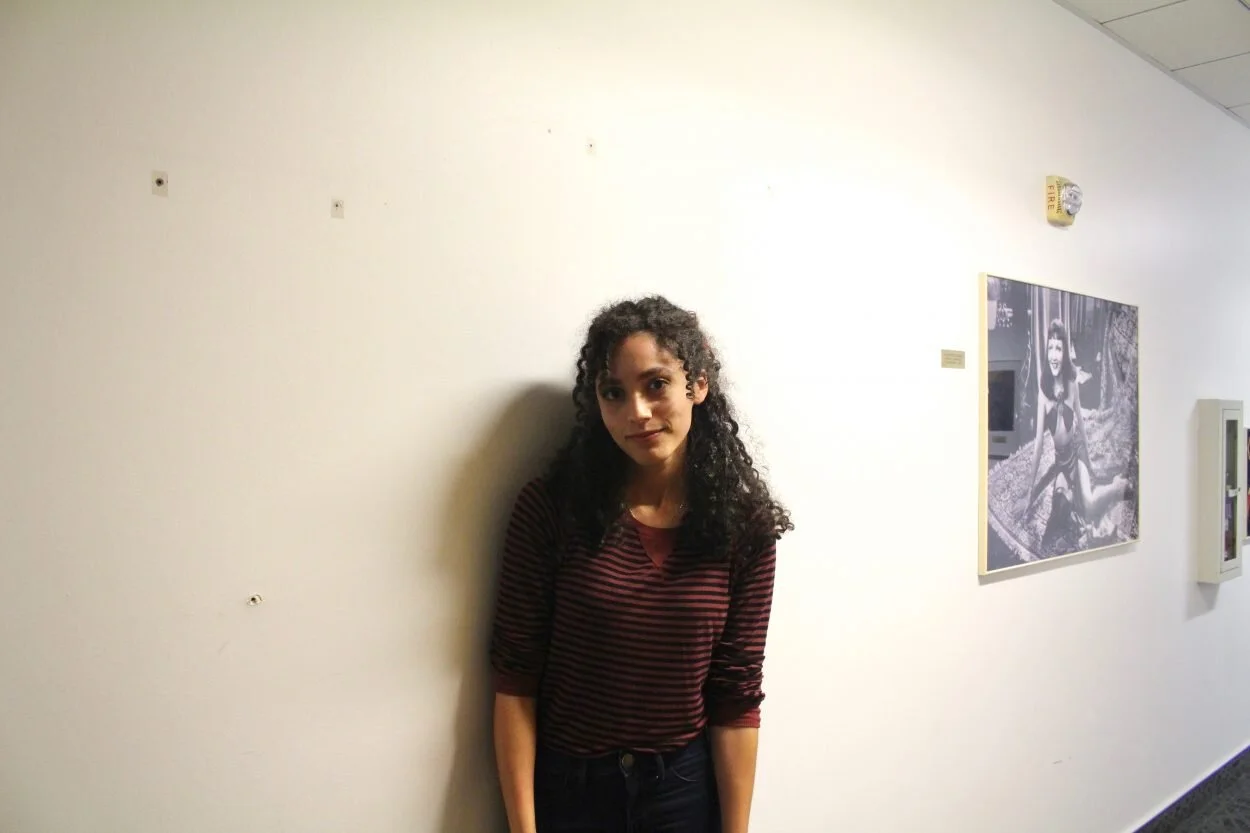Dodge College faculty votes in favor of removing ‘The Birth of a Nation’ poster
Arri Caviness, a first-year film production graduate student, was one of the first people on campus to advocate for the removal of Chapman’s “The Birth of a Nation” poster. She was also one of the first to watch it be taken down April 22 after faculty voted for its removal. Photo by Cassidy Keola
Dodge College of Film and Media Arts faculty have voted to remove Chapman’s “The Birth of a Nation” poster and one of the 1915 film’s advertising fliers from the hallway of Marion Knott Studios, according to an email sent out at about 4 p.m. April 22 by Bob Bassett, the college’s dean.
The poster and flier were removed shortly after the vote and will be returned to the donor, Cecilia DeMille Presley, who is the granddaughter of filmmaker Cecil B. DeMille.
Paul Gulino, president of Chapman’s Faculty Senate, told The Panther that the vote was conducted through SurveyMonkey. Dodge faculty were given two choices: remove the poster and return it to the donor or keep it up with a plaque that would contextualize it.
“There are people who were wondering about the posters that are up there, but never really thought about it a lot. There are some that did,” Gulino said. “When the students began to speak up, it brought people to an awareness that they didn’t have before.”
The vote was anonymous, Gulino said, and he did not know how many faculty members voted. Dodge College has at least 178 faculty members,according to Chapman’s website. In a series of emails between Dodge faculty, which Gulino provided to The Panther, many professors openly supported the poster’s removal.
This decision comes after at least 150 students protested the poster’s inflammatory past April 18, as the film depicts actors in blackface and is thought to have contributed to the resurgence of the Ku Klux Klan. Tensions had risen on campus during the week leading up to the protest, resulting in a community forum April 16 where students and faculty expressed their concern about the poster’s display.
Ron McCants, a Dodge adjunct professor in his first year at Chapman, was the only faculty to speak at the April 18 protest.
“I find it very difficult for me to ask you, as a professor, to have pride and love your school when it is not currently showing you that same love, and pride and respect,” McCants told the crowd.
In the email chain that Gulino provided to The Panther, Dodge professor Bill Dill wrote April 19 that he avoided walking down the hallway where the posters were once displayed.
“I find it profoundly unpleasant no matter how I brace myself before coming to them,” he wrote. “No matter how I numb myself, I can always feel my heart rate increase.”
Dill wrote that he knows of at least one unnamed student who had left Dodge College because of the posters.
“It wasn’t those posters alone, but the posters were the final tipping point that made that student feel unwelcome enough to leave,” he wrote.
Discussions about the poster’s removal began in late March when Arri Caviness, a first-year film graduate student, tweeted a photo of herself and other Chapman students standing in front of the poster.
Caviness was also one of the first students to see the empty space on the wall after the poster was taken down at around 4:30 p.m. She was in the Marion Knott Studios, she said, when a faculty member told her about the poster’s removal. She ran to the hallway where the poster was once displayed and watched as a staff member took it down.
“I’m absolutely thrilled,” she told The Panther April 22. “I’m just very happy that the faculty finally got a say; they listened to students. They did what was in everybody’s best interest and made the right choice. It makes me so much prouder to go here now … just with this little thing.”
After Caviness’ March 29 tweet, students and organizations like Black Student Union (BSU) began pressing administration to take the poster down, with President Daniele Struppa taking part in an April 16 BSU meeting. At the meeting, Struppa told students he would not take the poster down unless there was a faculty vote.
“If the president tells the faculty, ‘You have to take down the poster,’ that is censorship,” Struppa told The Panther after the meeting April 16. “That’s not the way we learn. Instead of erasing, we remember and we criticize and discuss and educate.”
While faculty have voted for the poster to be returned to the DeMille estate, the future of its physical location has not yet been announced. At the April 17 community forum, students and McCants proposed that it be displayed in a museum, like Orange’s Hilbert Museum, The Broad or the California African American Museum in Los Angeles, where it can be “appropriately dealt with,” McCants said at the forum.
“It doesn’t have to be on this campus,” he said.
Correction: An earlier version of this story misidentified Cecilia DeMille Presley as Cecil B. DeMille’s daughter. She is his granddaughter. This information has been corrected.

